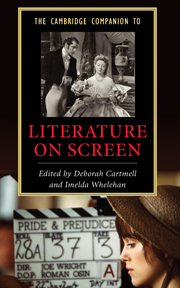Book contents
- Frontmatter
- Introduction - Literature on screen: a synoptic view
- Part One Theories of Literature on Screen
- 1 Reading film and literature
- 2 Literature on screen, a history: in the gap
- Part Two History and Contexts
- Part Three Genre, Industry, Taste
- Part Four Beyond the "Literary"
- Further reading
- Index
- Series List
1 - Reading film and literature
from Part One - Theories of Literature on Screen
Published online by Cambridge University Press: 28 September 2007
- Frontmatter
- Introduction - Literature on screen: a synoptic view
- Part One Theories of Literature on Screen
- 1 Reading film and literature
- 2 Literature on screen, a history: in the gap
- Part Two History and Contexts
- Part Three Genre, Industry, Taste
- Part Four Beyond the "Literary"
- Further reading
- Index
- Series List
Summary
Perhaps no aspect of filmmaking has been so thoroughly canvassed at every level, from cinema-foyer gossip to learned academic exegeses, as the matter of adaptation of literature into film. It is not as though adaptation is the only kind of relationship that might exist between film and literature, but it is the one that most persistently preoccupies the theorist, the critic, the reviewer, the buff, and the ordinary filmgoer alike. No one feels too awed by it to be willing to risk judgments about the latest adaptation, usually to the film's disadvantage; nor do theorists regard the subject as too simple to engage their attention.
So, to start, I should like to do what I can to dispose of some of the shibboleths that hover about the discourse, both popular and scholarly, relating to film-literature connections. First, it shouldn't be necessary after several decades of serious research into the processes and challenges of adaptation to insist that “fidelity” to the original text (however distinguished) is a wholly inappropriate and unhelpful criterion for either understanding or judgment. It may be that, even among the most rigorously high-minded of film viewers confronted with the film version of a cherished novel or play, it is hard to suppress a sort of yearning for a faithful rendering of one's own vision of the literary text. My italics are intended to highlight the impossibility of such a venture: that every reading of a literary text is a highly individual act of cognition and interpretation; that every such response involves a kind of personal adaptation on to the screen of one's imaginative faculty as one reads. And how is any film version, drawing on the contributions of numerous collaborators, ever going to produce the same responses except by the merest chance?
- Type
- Chapter
- Information
- The Cambridge Companion to Literature on Screen , pp. 15 - 28Publisher: Cambridge University PressPrint publication year: 2007
- 11
- Cited by

